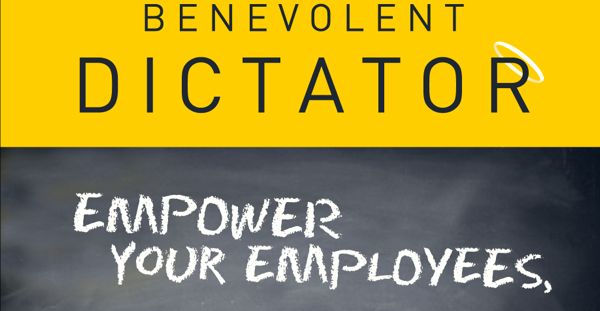Inc.
In a Q&A with Inc.com, OfficeMax founder argues that consensus-building is over-rated. Sometimes a leader just has to decide.
By Joseph Rosenbloom | Oct 10, 2011
Michael Feuer started OfficeMax from scratch in 1988, and built the office-supply chain into a 1,000-store behemoth before selling it to Boise Cascade Corp. for $1.5 billion in 2003.
The deal paid Feuer, 64, $60 million upfront, plus $50 million in fees that he collected as a consultant to Boise Cascade over five years.
Feuer is also a lecturer on the speaker’s circuit, a venture capitalist, and business consultant. He focuses on making investments in or giving advice to specialty retailers (but says the names are confidential). In June he published “The Benevolent Dictator,” which recaps lessons he learned as a start-up impresario and CEO.
Recently, Feuer talked to Inc.com contributing writer Joseph Rosenbloom about motivating employees, how he takes notes and delegates tasks, and the challenges of fundraising. Following is an edited, condensed version of the interview.
You say that you started in business with a severe birth defect: poverty. What do you mean?
My dad worked in a shoe store. I lived in a very small, 1,500-square-foot house in Columbus, Ohio. There was always food on the table, but not much more.
How did the poverty of your youth shape your management style as a CEO?
What I recognized is that all of us have something to prove. What I’ve done in my career is try to find really good people and find out what their hot button is, what motivates them. It sounds nefarious, but it’s really enabling people to fulfill their goals. The trick is to figure out how to crack that code with each of your top people.
Could you explain your book’s title, “The Benevolent Dictator”?
It doesn’t mean being a jerk. The benevolent part is doing what’s right for the greater good of all your constituents: customers, shareholders and, certainly, employees.
The dictator part is a recognition that at some point, when all the talking is done, someone has to make a decision. I tell my people that the business is not a democracy.
You closely monitor your employees, setting deadlines in frequent memos, and constantly checking on their progress. Is that an example of your dictatorial style?
It is tight control. When you have limited money and limited resources and limited people, you can’t let things slip through the cracks, because it can be a disaster particularly in the start-up stage. But you can’t be a policeman. It’s really more like having a good traffic control system with traffic lights and stop signs.
Are there times that a CEO needs to engage in Machiavellian deception?
Deception is kind of an ugly word. A good, benevolent dictator has to be a great sales person, because the real trick is making your decisions and making people think that it’s their decisions.
I don’t walk into a room and say, “Hey, sucker, you’re going to do it this way because I’m the boss.” That’s ridiculous. You go in and you sit down and say, “Hey, we’re working on this problem, and I’m thinking this thing, and I was thinking it through your eyes and how is it going to work for you?” And you just sort of push people along and maneuver a little bit. Business is a lot of theatrics.
At OfficeMax you maneuvered in a surprising way. You set up an operating committee of top executives to meet weekly without you, encouraging them to talk behind your back. Why the ordained gripe sessions?
I would rather have a forum where people have the ability to talk about me rather than the festering environment in most companies, where people spend all their life talking plenty about their boss. My deal with my top people is very simple. You can come in and close the door and tell me anything. Just don’t hit me. But the key thing is to get things out on the table. It’s a release valve. It just gets rid of a lot of steam.
Couldn’t the steam be so scalding that it would lower morale?
No, I think it’s a good safety valve. Here’s the reality: People are going to gripe anyway. It’s controlled griping.
At times you’ve taken notes on your shirt cuffs. How does your note-taking and follow-up procedure work?
If I have a thought of consequence, I write it down. Some great ideas come in funny places. I’m very notorious for writing on napkins in restaurants. Then I’ll flesh it out further when I have a chance.
What about the follow-up?
I transfer the notes to a computer. For each one I write “FU.” With a deadline, say, 12-1-11. Then I copy my assistant, who takes the note and files it for the month of December. The day before each month she pulls together the pieces for me.
And you send FU notes to employees?
That FU is kind of funny. When people first see one, they think, “Jesus, he is pretty bold to say that to me.” But it’s a follow-up system, a discipline that enables creative people–and a little bit scatter-brained people–be more creative.
You assign a high priority to educating your employees. For instance, you want each employee to think about what return on investment that every expense will generate. Isn’t it better to hire savvy people in the first place?
If you’re going to start a company, you can’t afford top, savvy people out there, the best of the best. I’ve learned I can do about anything with people except teach them to be smart. So I try to hire smart people, and I don’t worry as much about experience. But if you’ve got that raw intelligence, you teach them how to do it.
What advice do you have about how to raise capital in this economy when banks are so tight-fisted?
The deal with banks is pretty simple. Forget it. You go to a bank. They will loan you the money if you promise you won’t spend it and don’t need it. Banks are very bad for small business.
So what do you do?
Raising capital is not easy in this environment. I don’t want to mislead you. You’ve got to find out who’s going to win if you win. Then you have to come up with a creative way to give them something if they put skin in the game. If you don’t ask, you don’t get.





